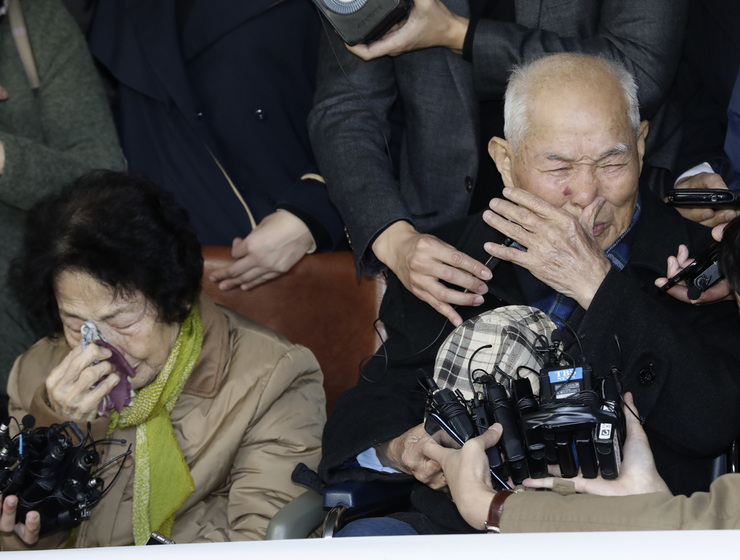Posted on : Jun.20,2019 16:12 KST
Modified on : Jun.20,2019 16:20 KST
 |
|
Lee Choon-sik, 94, the only remaining survivor among four plaintiffs that filed suit against the Japanese company responsible for their forced mobilization and labor during the colonial occupation, bursts into tears in front of the South Korean Supreme Court in Seoul on Oct. 30, 2018, after the court’s ruling that Nippon Steel & Sumitomo Metal Corporation should pay reparations to the victims. (Kim Myoung-jin, staff photographer)
|
On June 19, the South Korean government made a proposal for a settlement in which the victims of forced labor during the Japanese colonial occupation would be compensated through voluntary donations by Japanese and South Korean companies. This is the first time that the South Korean government has proposed its own solution to this issue since the South Korean Supreme Court ruled in October 2018 that the victims of forced labor were owed damages. The proposal is remarkable in that it appears to be an attempt to orchestrate a turning point in South Korea-Japan relations, which have been mired in conflict over the issue of compensating the victims. The Japanese government has reportedly rejected the proposal, which it says would not solve the problem. It’s regrettable for Japan to adopt such an attitude when it’s fundamentally to blame for the entire affair.
The proposal made by the South Korean government is one that many experts have described as a credible solution to the problem. Although the government didn’t mention which companies from the two countries would provide the donations, they would likely include Japanese companies such as Nippon Steel, Nachi-Fujikoshi, and Mitsubishi that were beneficiaries of forced labor and South Korean companies such as POSCO that were recipients of funds paid by Japan as part of its 1965 settlement with South Korea. The idea is for South Korean and Japanese companies that are directly or indirectly connected with forced labor to come forward and share the burden in order to provide relief to the victims.
It’s also significant that this proposal was made prior to the G20 summit, which will be held in Osaka at the end of the month. The fact that the South Korean government made this proposal despite its previous reluctance to intervene is thought to reflect its desire to hold a summit with Japan during the G20 in order to repair bilateral relations. That makes it difficult to understand why Japan would have written it off so quickly.
Japan’s Ministry of Foreign Affairs announced that it’s still asking the South Korean government to set up an arbitration committee about the Japan-South Korea agreement that settled outstanding claims. That suggests that Japan is pushing the South Korean government to make unilateral concessions, a pretty audacious thing for the perpetrator to do. The reason this issue continues to rankle for more than 70 years is that Japan has neither offered a sincere apology to the victims of forced labor nor provided them with proper compensation. Without any soul-searching, Japan continues to hide behind the 1965 agreement, which didn’t reflect the wishes of the victims. That’s not the attitude of a problem solver, and it prompts us to ask whether Japan is really okay with leaving its relations with South Korea in such an abysmal state.
As long as Japan is feigning innocence and shifting all the responsibility to the claims agreement, there’s little chance that bilateral relations can be developed with an eye on the future. We hope that Japan will give the South Korean government’s proposal serious and thoughtful consideration and treat it as a springboard for dialogue that will lead to a new solution.
Please direct comments or questions to [english@hani.co.kr]









